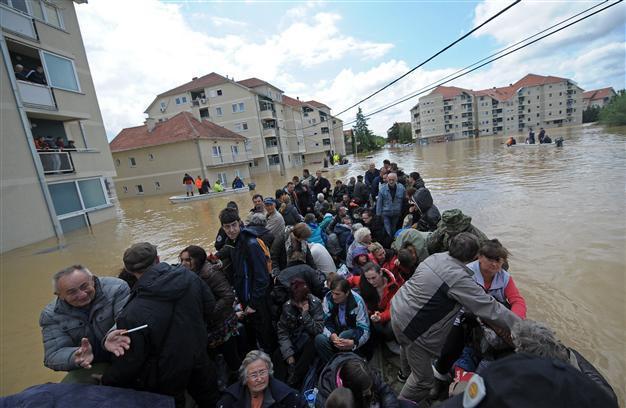Balkans on alert as swollen rivers due to hit new peaks
BELGRADE - Agence France-Presse

A group is evacuated on an amphibious vehicle over flooded streets in the town of Obrenovac, 40 kilometers west of Belgrade, on May 17, 2014 AFP Photo
The Balkans were on alert Tuesday as swollen rivers were due to reach new peaks after days of devastating floods and landslides that have claimed at least 49 lives.
More than 1.6 million people have been affected by flooding of the river Sava and its tributaries while tens of thousands of hectares of farmland have been inundated and many houses and buildings destroyed or damaged.
These are the worst floods the central European region has suffered in a century.
In Bosnia, where more than 100,000 people have been evacuated in the worst exodus since its 1992-1995 war, thousands of volunteers were struggling to reinforce dikes along the Sava river.
Bosnia declared a day of mourning for the country's 24 dead while health authorities began disinfecting flooded areas as temperatures rise above 22 degrees Celsius (71.6 Fahrenheit) in a bid to prevent diseases from spreading.
"We will face a major fight against epidemics and infectious diseases which are inevitable after such floods," said top Bosnian official Nermin Niksic.
Bosnian Foreign Minister Zlatko Lagumdzija said more than a quarter of the country's population of 3.8 million "has been affected by the floods" after the heaviest rainfalls on record began last week.
"Right now, more than one million people have no (clean) water," he said.
In Serbia, where the Sava has already caused unprecedented havoc in the northwestern region bordering Bosnia and Croatia, thousands of volunteers were putting up fresh dykes along its banks.
Weather officials warned the Sava would rise further on Wednesday, threatening higher levels of the massive Danube as the Sava flows into it in the Serbian capital Belgrade.
In Belgrade, volunteers have placed some 12 kilometres (seven miles) of sandbags to prevent flooding of the Serbian capital.
In Obrenovac, one of the most affected towns in Serbia, rescuers have managed to contain the waters around the Nikola Tesla power plant which produces 50 percent of the country's electricity.
In Serbia, more than 30,000 people have been evacuated so far from the areas affected by floods, including nearly 13,600 in the region of Obrenovac, or half its population.
Serbian Prime Minister Aleksandar Vucic told a government meeting that so far 14 deaths have been registered in Obrenovac alone, with autopsy results showing half of them drowned.
"We have been affected ten times more then the other countries in the region, but I hope the toll would not show that," Vucic said.
The death toll from the floods in the region rose to at least 49 Tuesday, with Vucic saying the latest two victims were found in Obrenovac.
Landslides claimed at least one victim in Serbia and one in Bosnia.
Health authorities have ordered inhabitants not to return to their homes until the areas are cleared from debris and safe from disease.
"We have to react properly to avoid an even worse catastrophe, to avoid infectuous diseases," Serbian Health Minister Zlatibor Loncar told state TV RTS.
Tonnes of dead animal carcasses have already been taken from farms for destruction, but muddy areas and landslides have slowed down their collection.
Dozens of towns and villages have been cut off and over 2,000 landslides already reported, with water levels expected to continue rising in the coming days.
Neighbouring Croatia has also evacuated thousands of people from along the river Sava.
In a potentially deadly side-effect, officials in Bosnia warned on Monday that some 120,000 unexploded mines left over from the Balkan war of the 1990s could be dislodged and moved.
"Water and landslides have possibly moved some mines and taken away mine warning signs," Sasa Obradovic, an official of Bosnia's Mine Action Centre told AFP.
He warned residents to be "extremely cautious when they start cleaning their houses, land or gardens as the remaining mud could hide mines and other explosive devices brought by rivers."
